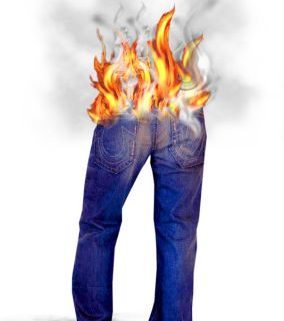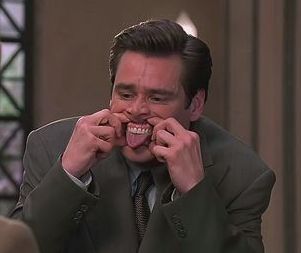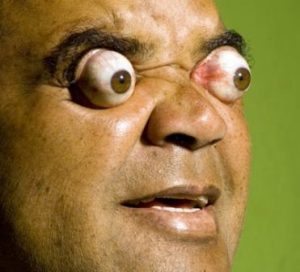I Know You’re Lying: Your Pants Are On Fire And Other Tell-Tale Signs
I’ve sat across the table from some pretty darn good liars, some of the best I’ve ever seen, actually. And I’ve heard it all. “I loved my wife. Certainly, I couldn’t have killed her.” “I was at home knitting a cover for my Bible.” “I don’t own a gun.” “Let lightning strike me dead right now if I’m not telling you the truth, Detective Lofland.” Yeah, right. My office ceiling looked like Swiss cheese from all the lightning strikes.
But as they say, it takes one to know one, and investigators—good investigators—are some of the best liars in the business. They have to be great at fabricating tall tales in order to play “the game.” At times (the right times), they must be able to convincingly tell the bad guys exactly what they need to hear so they’ll either feel comfortable enough to spill the beans or, properly intimidated enough to the point of confessing to butchering dear old grandma last Saturday night.
Maybe I should say that good interrogators are good actors, instead. Sounds better than saying they’re good liars, right?
Jim Carrey – Liar Liar
But aren’t all actors lying to us when they pretend to be someone they’re not? Same game, different stage.
An important aspect of the interview process is the ability to accurately detect the lies flowing across the lips of the bad guys. Well, that is, the important lies they’re telling. I say “important” because almost every word that comes out of their sweet and innocent little mouths is a lie; therefore, cops need to separate the non-needed lies from the real clues.
So how do investigators know when the crooks are being less than honest? Well, here are five things (there are more, but we’ll start with these) they look for during an interview.
Liars tend to…
1. Repeat a question before answering. “Did you kill Grandma?” A pause. “Did I kill Grandma?…Nope. Wasn’t me.”
2. Their sentences are broken, or fragmented, unlike the complete sentences of a truthful person. “No…I, um…I…didn’t (a hard swallow) um…kill…dear, sweet, um…Grandma.”
3. Liars, more often than not, do not provide specific details in their responses to questions. “Where were you last night and what were you doing?” the detective asked. The heavily-muscled thug leaned back in the wooden chair and crossed his jailhouse- tattooed arms over his chest. “Home,” he said. “Weren’t doin’ nuttin.”
4. They tend to use hand gestures that are directed toward themselves, whereas truthful people normally use outward hand gestures (arm waving, pointing, etc.). For example. A liar:
Lies flowed from her red lips like last year’s honey. Slow and deliberate. She toyed with her hair, twirling the curly lock that hung over her left cheek, first winding it one way then the other. She used her right hand to pick imaginary lint from her sweater, a sweater that now had a permanent place in the young investigator’s dreams. She was as nervous as a whore in church. But her words were cold. Cold as a well-digger’s ass.
5. Liars tend to look away from the investigator during the questioning, but only briefly. Truthful people look away for longer periods of time, thinking before they answer the question. This is a movement that’s quite obvious and you’ll know it when you see it.
Not an actual liar…
For more on this topic click here first and then here (part 2).
* * *
Only 30 days left until the big event!








Number 3 reminds me of one of my all-time favorite deposition exchanges:
Q: where do you work?
A: i work with my brother.
Q: what does your brother do?
A: Nothing.
Elizabeth
I tend to play with my hair all the time, turning the curls in my fingers. Especially when I’m thinking.
I love this blog!! It fits right in with my dual Criminal Justice/Psychology training. I have a question you might be able to answer–so far nobody hasbeen able to. First, my eyes are crooked and I only look out of one at a time (while the other roams around–lazy eye). However, my question deals with normal eyes but a different scenario. I was born left-handed. I still eat with my left hand and reach, etc.. with it. I write, however with my right hand as it was changed in kindergarten. I also learned to crochet and sew right-handed (but I don’t move the nedle/hook, I move the material in my left hand). That said–how would a person be read in such a scenario, as right-handed or left-handed? Has there been any studies performed as to whether changing a person’s natural handedness also changes responses of other body functions–or do they remain the same?
That’s a keeper. Thank you. One thing from a rather well-trained actor … actors tell the truth under imaginary circumstances. I believe it’s just the opposite with criminals.
CL – I’m glad you found today’s blog entertaining.
Kai – Please click the two links in the last sentence, in order. You’ll find your answers there.
Is the ‘looking one way’ liar thing an accurate assessment? I was told, long ago, that if you’re lying you look to one specific side, while if you’re not, you look the other way. And does that reverse based on what hand you use?
Thanks
Kai
I’m just now finding your blog…luckily, I wasn’t drinking anything while reading it. I used to refer to myself as a cop-junkie…I had so many friends who were cops, wanted to be one myself, and watched every episode of cops I could. This was a hilarious article!!!!